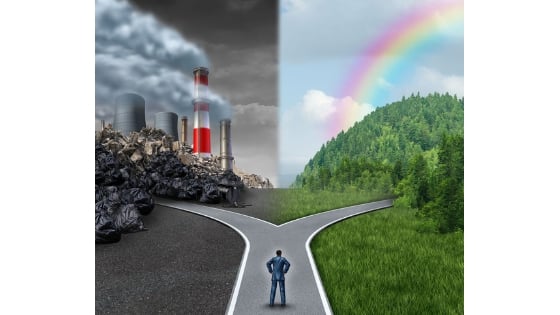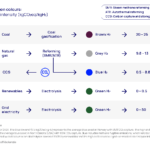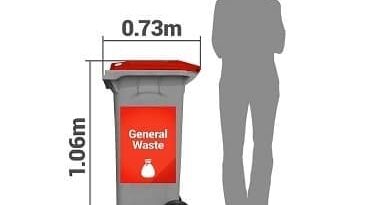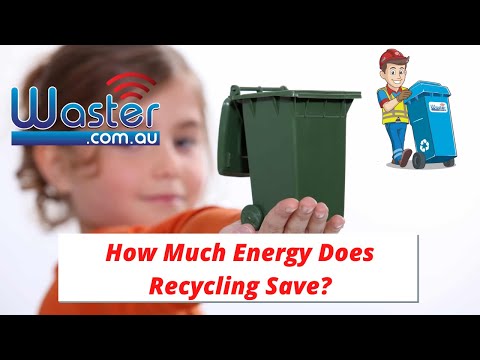How Much Recyclable Material Ends Up In Landfills? Is It Getting Worse? 🚯
Energy Disrupter
How Much Recyclable Material Ends Up In Landfills? 🚯: At Waster, we often meet with potential customers who are very suspicious about recycling and how much recyclable material ends up in landfills. To be honest, some people really believe the whole recycling industry is a con job. As a result, we are often asked this particular question, “does recycling go to landfill?”
>Download Now: Free PDF Business Owners Guide To Commingled Recycling Bin Services
Surveys of the general population even reflect this lack of confidence. The Guardian newspaper reports:
“Two-thirds of Australians believe their household recycling is sent to landfill and 72% said they would recycle more if they knew that their household waste was reliably recycled, a survey has found.”
In addition, Australia, of course, is not the only one lacking in recycling efforts. According to GreenMatters, in the United States, they only recycled 35 per cent of their solid waste in 2017. That is only around 94.2 million tonnes out of the 267 million tonnes of solid waste they produced last year.
The mainstream news – not just the Guardian, in particular – has covered a number of stories about how much recycling ends up in landfill as numerous Victorian council areas have started sending their recycling direct to landfill. This is also impacting commercial collections (including Waster) in Melbourne in the short term.
[embedded content]
In today’s blog, we will answer as many questions as possible. Hopefully, we can give our customers and readers alike some clarity to the question.
How much recyclable material (unfortunately) ends up in landfills?
We have covered in previous blogs (why recycling is a waste of time) how recycling is not a fit all solution to our consumer and throwaway culture. Recycling handles only a percentage of the total waste produced with huge volumes of waste ending up in landfill.
Actual figures as to how much recyclable material ends up in landfill are impossible to calculate, given the mixture of wastes and various locations dumped at.
TheConversation.com reports that:
“It’s hard to say exactly how much recycling is processed in Australia, as there’s no coherent national database of facilities. But, according to a 2011 government report, Australia generates roughly 50 million tonnes of waste a year, around 50-60% of which is recycled.”
Take a look at our blog on the value of waste here. Maybe this can help with our landfill and recycling problem in Australia – who knows?
Three questions about how recyclable material ends up in landfills
We would, of course, want you to think critically in this particular situation. And for this reason, we present you with three questions about recyclable materials ending up in landfill.
Question 1: does recycling collected in recycling bins go to landfill?
The answer is yes, though at a much lower rate than people think. Due to ever-increasing waste levies, it is in waste companies financial interest to recycle as much as possible. Due to the cost of recycling vs landfill (i.e., $300 a tonne for general waste tipping in Sydney versus a cash rebate for cardboard), it explains why companies really are incentivised to recycle wherever and whenever possible.
Of course, some unscrupulous companies will misrepresent where waste goes such as the practice by some firms of shipping huge volumes of waste to Qld to avoid the NSW waste levy. However, in the vast majority of cases, commercial recycling is recycled.
This is different for many council recycling services. Check the details out below for more information.


Question 2: does recycling in general waste end up in landfill?
How much recyclable material that go in general waste ends up in landfills? But more importantly, does it really end up in landfill? The answer here is, of course, yes. Huge volumes of recyclable materials disposed of in red general waste bins (i.e. not recycling bins) end up in landfill. There is not a huge amount that can be done – nationwide in this instance in 2019.
There are promising technologies coming on board that will recycle from general waste – but they are currently niche or small facilities.
Question 3: do landfills recycle?
Of course, when this happens, people will find it positive if recyclable materials end up in landfills. This only means we can rest assured and know that workers there will deal with the mistakes and ensure recycling still occurs.
But unfortunately, the answer is no. Landfills are a bit like graveyards; once in landfill, it basically decomposes and rots away. No landfill can recycle materials in that state.
Refreshing news to hear, however? Modern landfills now capture the gas and create electricity. Some people (like Waster) argue that food waste, in particular, will be a valuable commodity in the future to produce electricity.
Why are councils sending their recyclable materials to landfill then?
You may have read articles recently saying many councils are sending their recycling to landfill. The ABC reports that:
“Four Melbourne councils have now confirmed they are sending their recyclable waste to landfill after the Environment Protection Authority (EPA) banned one of the state’s largest recycling companies from accepting waste at two of its facilities.
“The EPA on Friday banned SKM Recycling — which receives about half of Victoria’s kerbside recycling across three sites — from accepting material at its Coolaroo and Laverton North sites.”
This has led to a short term issue where recycling facilities (commingled recycling) in the Geelong area are over capacity and cannot accept any more material due to health and safety grounds.
This is impacting all Geelong area collections including commercial services for the short term.
What is causing this issue?
The major problem as to why recyclable material ends up in landfills is threefold:
- The low quality of recyclables collected from household commingled bins. Many councils always take away the commingled waste. And in many cases, it is basically waste. If these bins were for commercial collections, they would be rejected by the truck. However, councils are under more pressure to accept low-grade recycling
- China is not accepting this low-grade recycling anymore. Since 2018, China is only accepting high quality, clean recycling materials. Read our blog on the China waste problem to learn more.
- A lack of recycling facilities suitable for this type of waste. The closure of one facility in Melbourne has resulted in four councils sending their recycling to landfill. This highlights a lack of investment in recycling, a clear misalignment of recycling incentives for households (to separate waste), councils and recycling firms (i.e., to invest in new facilities).
One of the biggest issues in Australia is our lack of manufacturing. There is basically little point in recycling materials that will need to be shipped offshore to be used in manufacturing again. This is an unforeseen impact of the reduction in Aussie manufacturing over the last 40 years.
Conclusion on how much recyclable material ends up in landfills
There is a real disconnect between what people want and what is practical:
“Asked how they would prefer Australia manage its recyclable waste in the wake of that decision, 69.7% of respondents said that it should “invest in new technology to reform waste into high-value materials for re-use”, while 16.6% supported it to be incinerated for electricity generation. Only 2.7% supported finding another country to take up the export trade, and 5.7% supported dumping it in landfill.”
The problem here is two-fold. The technology does not exist in a number of instances to separate and recycle materials. And secondly, even if it is recycled in Australia, there is very little actual manufacturing industry left to use the recycled materials.
For example, the Huffington Post reported that:
“A recent Ipsos study has revealed 20 per cent of Australians put their recycling items in a plastic bag and place it in the yellow bin.”
In many ways, people want to continue the consumer and throw-away lifestyle. They also want to blame someone else for not recycling everything and making the problem go away.
There is no existing or likely recycling technology that will be able to really recycle. In other words, I mean make suitable for valuable reuse that can deal with the sheer volume of plastic junk we buy and throw away.
The problem is huge. More specifically, it is a society-wide issue. But, we have not even asked the questions, let alone come up with a real answer.
It is always someone else’s fault! Sorry, but am I getting grumpy in my old age?
















